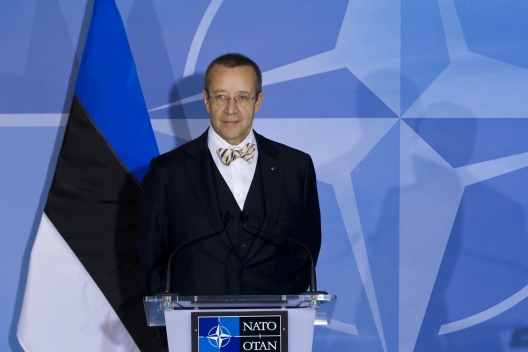 “An aggressive, revanchist power,” in the Estonian leader’s words, makes the unthinkable thinkable. “We were already caught off guard with Crimea,” he [Estonian President Toomas Hendrik Ilves] says. “Once you lose the predictability factor, you can’t be 99% sure they won’t do something.” The most dramatic something would be a Russian military incursion into NATO’s front-line states. . . .
“An aggressive, revanchist power,” in the Estonian leader’s words, makes the unthinkable thinkable. “We were already caught off guard with Crimea,” he [Estonian President Toomas Hendrik Ilves] says. “Once you lose the predictability factor, you can’t be 99% sure they won’t do something.” The most dramatic something would be a Russian military incursion into NATO’s front-line states. . . .
The Russian attack on Georgia in 2008 set off alarms in the Baltics, which renewed their push to strengthen their defenses. Germany vetoed them and the U.S. concurred. An American diplomat in 2009 called Estonia “paranoid” about Russia, in a confidential cable released by WikiLeaks. Since the outbreak of the Ukraine crisis, Estonian leaders have steered clear of the I-told-you-so’s. “I don’t get any, unfortunately, thrills out of vindication,” says Mr. Ilves. “But we have been told by some of our friends, ‘We did think you were paranoid and overreacting and now we think you’re right. . . .’ “
In recent years the Baltics have watched the modernization of Russia’s military up close. Unhappy with the performance of his troops in Georgia, Vladimir Putin has poured resources into the military. The Russian defense budget is set to grow 44% in the next three years and account for a fifth of all central government spending, according to Jane’s Defense.
Russia has doubled the number of troops in the Baltic region since 2009, says Kaarel Kaas of Tallinn’s International Center for Defense Studies, and it has focused on improving special rapid-reaction forces, long-range missiles and air-defense capabilities. Kaliningrad, a militarized Russian enclave between Poland and Lithuania, is “like a giant aircraft carrier,” he says.
As NATO cut budgets and sought to reassure Russia about its peaceful intentions, Mr. Putin put his new might on show. The “Zapad” (“West”) biannual military exercise that began in 2009 involved tens of thousands of troops in practice attacks on Baltic countries, culminating in a faux nuclear strike on Warsaw.
The Crimean operation was the coming-out party for Russia’s modernized military. Highly professional and well-equipped special forces were the core of the lighting-quick invasion. Russia used jamming technology and cyberwarfare to neutralize the Ukrainian troops’ communications. Russian soldiers mixed with local militias and evaded notice by Western military intelligence until it was all over. “The change in the way that Russia does things is quite astounding,” says Mr. Ilves. “The old Finnish Winter War model of a million people coming across the border and just swamping, that’s long gone.”
President Ilves says the EU”response is going to be economic fundamentally,” and limited by concern over the cost to business, which explains the bloc’s reluctance to impose stronger sanctions on Russia. Yet at NATO, “they have woken up to the new reality.” He declares Estonia “quite satisfied” with the decision by its foreign ministers this week to suspend contacts with Russia and rethink eastern defenses.
The rethinking within NATO has only begun. The U.S. and the rest of the alliance stopped short of the demands from Poland and the Baltic states to forward deploy NATO troops. Estonia managed on Thursday to get NATO’s blessing to turn the brand-new Amari military airfield near Tallinn into the first NATO base in the country. This small Balt tends to be proactive. While European governments axed some $50 billion from military budgets in the last five year amid fiscal belt-tightening, Estonia is only one of four NATO allies to devote at least 2% of gross domestic product to defense, supposedly the bare minimum for security needs. . . .
To Mr. Ilves, the alliance’s most urgent need is “increasing deterrence in the region.” He won’t get drawn into discussing a wish list, but with deliberate understatement says, “boots on the ground is kind of a good idea.” The Estonians have told U.S. officials that American boots are best. The presence of U.S. soldiers in the Baltic states and Poland, the other front-line state, would become the most reliable tripwire for a NATO response to any Russian encroachment. Mr. Ilves offers a different formulation: “I wouldn’t say a tripwire but a sign that we’re serious here.”
As many officials at NATO’s Brussels headquarters admit, the Russian military could today roll over Estonia, Latvia and Lithuania in hours. The countries’ indefensibility was an argument made against their membership. “Berlin was never defendable,” Mr. Ilves shoots back, referring to the Cold War-era. “Ever. There was no concept of defending the allied sectors of Berlin. But what defended it was the idea that if you come in, there is gonna be a whole lot of smoke and ashes elsewhere. . . .”
Europeans farther away from Russia are reluctant to confront Mr. Putin, and Barack Obama has not been interested in Europe for most of his presidency. That raises a question: What if NATO balked? Then “everyone in NATO comes under existential threat,” Mr. Ilves says. “Then every country is on its own. As soon as that happens NATO no longer exists as an alliance. It’s simple.”
Mr. Kaminski is a member of the Journal’s editorial board.
Image: Estonian President Toomas Henrik Ilves, Dec. 9, 2010 (photo: NATO)
